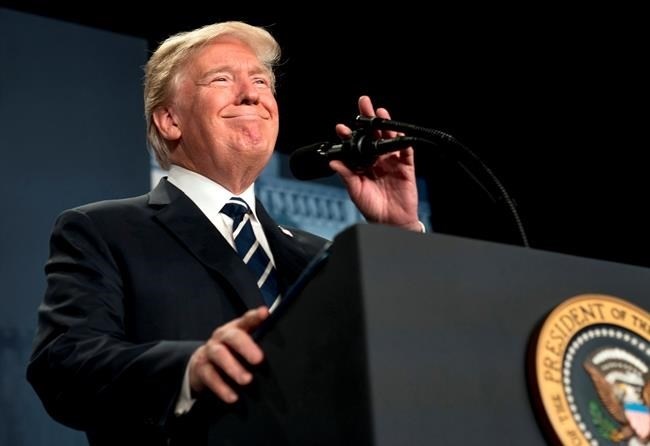
President Donald Trump pauses while speaking at the 2018 House and Senate Republican Member Conference at The Greenbrier, in White Sulphur Springs, W.Va., Thursday, Feb. 1, 2018.
Image Credit: AP Photo/Andrew Harnik
February 02, 2018 - 4:30 PM
WASHINGTON - After a drumbeat of anticipation, a secret memo was released Friday that President Donald Trump's allies in the media and Congress had predicted would set off a bombshell, exploding the entire foundation of the Russia investigation.
Spoiler alert: Not quite.
What the just-declassified memo does is allege that a key source in the Russia affair hated Trump, and that federal officials central to the probe against him played fast and loose with surveillance protocols.
"I think it's a disgrace," Trump said Friday.
"A lot of people should be ashamed of themselves — and much worse than that."
He made the remarks after approving the release of a four-page memo written by Devin Nunes, the Republican chair of the House intelligence committee. The memo centres on allegations of impropriety in how federal officials obtained the right to monitor Trump foreign-policy adviser Carter Page.
It alleges that:
— British ex-spy Christopher Steele detested Trump and was desperate to stop him from being president. At the time, it says Steele was being paid US$160,000 by a firm hired to dig up dirt on behalf of the Hillary Clinton campaign.
— Steele talked to the media while also acting as an FBI informant. During the 2016 election, he communicated concerns — first to Yahoo News, then Mother Jones magazine — that Trump was compromised. The memo says he misled the FBI about his contacts with journalists.
The memo says the FBI later dropped him as a source: "Steele's numerous encounters with the media violated the cardinal rule of source handling — maintaining confidentiality — and demonstrated that Steele had become a less-than-reliable source for the FBI."
— The FBI had leaned heavily on Steele's tips to renew a warrant to spy on Trump adviser Carter Page. The warrant was renewed in October 2013. Federal officials had previously monitored Page as early as 2013, amid concern he was a Russian asset.
— Federal officials did not disclose the partisan payments to Steele when they sought the warrant in national-security court.
—Several senior officials signed off on the warrant request, with one key name on that list: Rod Rosenstein. He is now the top Justice Department official in change of the Russia investigation. If he were fired and replaced with someone more hostile to the probe, his successor could either end the investigation or set new rules to constrain it.
Trump was asked whether he wanted to fire Rosenstein and replied: "You figure that one out."
But the document unveiled Friday fell short of the more hyperbolic previews offered by Trump's staunchest allies.
One memorable example was Fox News prime-time host Sean Hannity, who predicted it would be worse than Watergate and would end the Mueller investigation by proving that it rested on a faulty foundation.
"Your witch hunt is now over," Hannity declared on his show a few days ago.
There's a glaring weakness in the argument that the document fatally undermines the Russia probe.
It's pointed out in the document itself, in the final paragraph on the final page. The document confirms that the FBI counter-intelligence probe into the Trump campaign ties with Russia began in July — three months before the events described in the memo.
It says the FBI probe started in July 2016 as the result of a tip regarding another Trump aide, George Papadopoulos. Recent news reports have said the tip involved Papadopoulos disclosing over drinks with a European diplomat that the Russians had Hillary Clinton's emails.
Papadopoulos has since pleaded guilty to lying to the FBI, and is now co-operating with the Mueller probe.
Democrats dismissed the document as a dud, at best. At worst, they cast it as a dishonest work of partisan origami that cuts around inconvenient facts that remain classified and are central to the case.
Their view was shared by the fired head of the FBI who originally launched the Russia probe.
"That's it?" James Comey tweeted.
"Dishonest and misleading memo wrecked the House (intelligence) committee, destroyed trust with (the) Intelligence Community, damaged relationship with (the national-security) court, and inexcusably exposed classified investigation of an American citizen.
"For what? (Department of Justice) & FBI must keep doing their jobs."
There was also criticism from the Republican side.
Sen. John McCain blasted unnamed people from his own party attacking law enforcement, and undermining an important probe into Russian election-meddling: "The latest attacks on the FBI and Department of Justice serve no American interests — no party's, no president's, only (Vladimir) Putin's," McCain said in a statement.
"If we continue to undermine our own rule of law, we are doing Putin’s job for him."
Other Republicans took a nuanced view.
They said it was important to see the memo, which they say raises troubling questions about civil liberties and whether espionage processes were properly followed. On the other hand, they remained committed to the Russia investigation.
"I ... remain 100 per cent confident in Special Counsel Robert Mueller," said Republican lawmaker Trey Gowdy.
A similarly balanced take came from Will Hurd — a Republican lawmaker who used to be an undercover CIA counter-terrorism agent. Hurd voted for the release of the document, but explained in a Washington Post opinion piece that he wants the Mueller investigation to continue.
News from © The Canadian Press, 2018